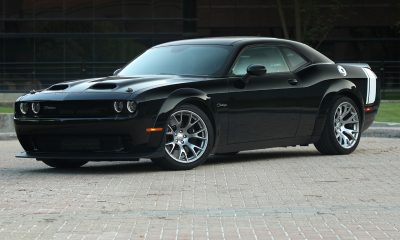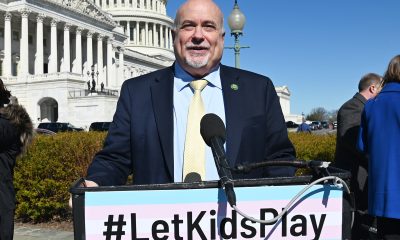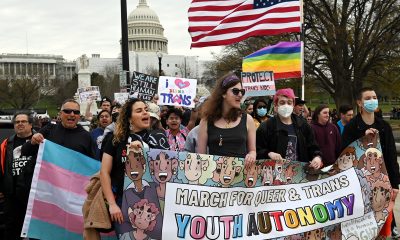Arts & Entertainment
Sam inspires college athletes to come out
Despite progress, homophobia persists in locker rooms
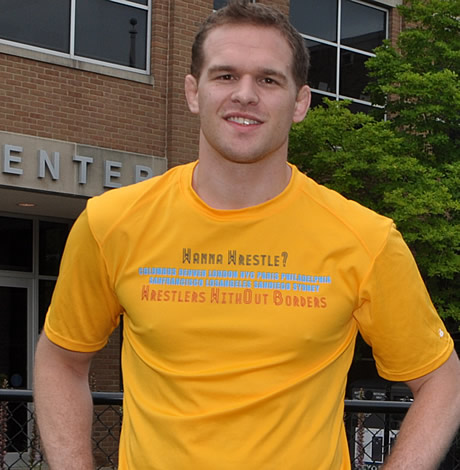
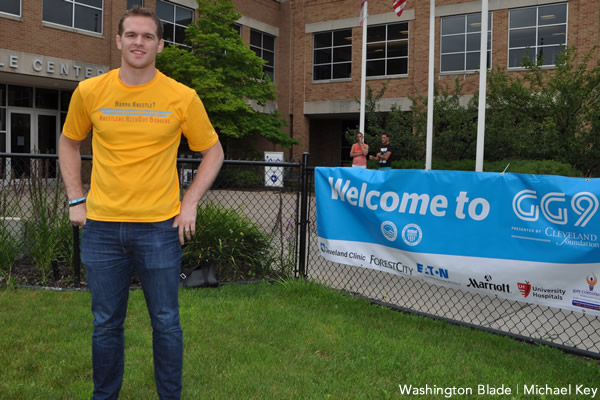
Hudson Taylor, founder of Athlete Ally, said Michael Sam has inspired many collegiate athletes to come out. (Washington Blade photo by Michael Key)
A number of collegiate athletes have come out as gay in the months since former University of Missouri defensive end Michael Sam publicly declared his sexual orientation.
Parker Camp, a member of the University of Virginia swim team, began coming out to his family and friends earlier this year as he told Outsports.com, an LGBT sports website. He and four other teammates held a handwritten sign that read “2 of us gay. The other 3 don’t care” as part of an ad campaign promoting diversity.
Derrick Gordon of the University of Massachusetts in April became the first member of a NCAA Division 1 basketball team to come out as gay. Connor Mertens, a kicker for the Willamette University football team in Oregon, in June publicly acknowledged his bisexuality.
Edward “Chip” Sarafin, a backup senior offensive lineman for Arizona State University, earlier this month told Compete, a Phoenix-based sports magazine, that he began coming out to his teammates last year.
“It was really personal to me, and it benefited my peace of mind greatly,” he told Compete.
Hudson Taylor, founder of Athlete Ally, a group that advocates for LGBT athletes, told the Washington Blade during a recent telephone interview he feels Sam has inspired many collegiate athletes.
“[He] has walked in the shoes of every closeted athlete and every closeted athlete is walking in Michael Sam’s shoes,” he said. “As Michael has a successful career and has come out without incident, I think it shows that next generation of athletes that sport is a welcoming environment for them to be themselves.”
Helen Carroll, director of the National Center for Lesbian Rights Sports Project, agreed.
“They can see positive things happening with those people,” said Carroll. “That can even be just a college student coming out, their coming out story and their teammates accept them and their coach is accepting.”
Challenges remain for collegiate athletes who are considering coming out.
Carroll said homophobic comments in the locker room persist and may deter collegiate athletes from publicly disclosing their sexual orientation or gender identity and expression. She also referred to what she described as “old-school coaches” who discourage their players from coming out until they graduate.
“There’s still that out there in a lot of places,” Carroll told the Blade.
The case of former Penn State women’s basketball coach Rene Portland remains among the most high-profile examples of anti-LGBT discrimination in collegiate sports.
A former player, Jennifer Harris, accused Portland in a 2005 lawsuit of having a “no-lesbian” policy and trying to force her to quit the team, even though she is not gay.
Harris also sued then-Penn State Athletics Director Tim Curley, who is among the former university administrators facing charges for allegedly covering up sex-abuse allegations against former assistant football coach Jerry Sandusky.
She reached a confidential settlement with Portland and Curley in 2007.
Penn State later fined Portland $10,000 and ordered her to take a diversity-sensitivity class after the university settled with Harris.
Portland resigned in 2007 after 27 seasons.
“We’re not as likely to see a case like that, but I am sure somewhere across the nation there are more Rene Portland’s out there,” said Carroll.
Other cases have generated headlines over the past year.
Anthony Villarreal, a former track runner at William Jessup University, a Christian university outside of Sacramento, Calif., said school administrators expelled him last year because he is gay. Leah Johnson last month told Outsports.com an assistant coach at the University of Richmond in Virginia told her to break up with her girlfriend, Miah Register, “before she steps foot on this campus” to play for the team.
In spite of these cases and others like them, Carroll and Taylor maintain more collegiate athletes will come out. And they both look to the way the University of Missouri handled Sam’s decision to publicly disclose his sexual orientation as an example of how they feel administrators and coaches should handle it.
“Michael Sam was out for a good period of time before the world knew about it,” Taylor told the Blade. “It seemed like it didn’t matter one bit to his teammates, to his coaches or to the Missouri family. Missouri did a great job and really showed that they are a welcoming environment for LGBT athletes.”

Team DC, the umbrella organization for LGBTQ-friendly sports teams and leagues in the D.C. area, held its annual Night of Champions Awards Gala on Saturday, April 20 at the Hilton National Mall. The organization gave out scholarships to area LGBTQ student athletes as well as awards to the Different Drummers, Kelly Laczko of Duplex Diner, Stacy Smith of the Edmund Burke School, Bryan Frank of Triout, JC Adams of DCG Basketball and the DC Gay Flag Football League.
(Washington Blade photos by Michael Key)




















The 2024 National Cannabis Festival was held at the Fields at RFK Stadium on April 19-20.
(Washington Blade photos by Michael Key)
















Covering the @NatlCannaFest at RFK Stadium for @WashBlade . Stop by the LGBTQ+ booth and pick up a paper if you are here. pic.twitter.com/is7hnsaPns
— Michael Patrick Key (@MichaelKeyWB) April 20, 2024
Theater
‘Amm(i)gone’ explores family, queerness, and faith
A ‘fully autobiographical’ work from out artist Adil Mansoor

‘Amm(i)gone’
Thorough May 12
Woolly Mammoth Theatre
641 D St., N.W.
$60-$70
Woollymammoth.net
“Fully and utterly autobiographical.” That’s how Adil Mansoor describes “Amm(i)gone,” his one-man work currently playing at Woolly Mammoth Theatre.
Both created and performed by out artist Mansoor, it’s his story about inviting his Pakistani mother to translate Sophocles’s Greek tragedy “Antigone” into Urdu. Throughout the journey, there’s an exploration of family, queerness, and faith,as well as references to teachings from the Quran, and audio conversations with his Muslim mother.
Mansoor, 38, grew up in the suburbs of Chicago and is now based in Pittsburgh where he’s a busy theater maker. He’s also the founding member of Pittsburgh’s Hatch Arts Collective and the former artistic director of Dreams of Hope, an LGBTQ youth arts organization.
WASHINGTON BLADE: What spurred you to create “Amm(i)gone”?
ADIL MANSOOR: I was reading a translation of “Antigone” a few years back and found myself emotionally overwhelmed. A Theban princess buries her brother knowing it will cost her, her own life. It’s about a person for whom all aspirations are in the afterlife. And what does that do to the living when all of your hopes and dreams have to be reserved for the afterlife?
I found grant funding to pay my mom to do the translation. I wanted to engage in learning. I wanted to share theater but especially this ancient tragedy. My mother appreciated the characters were struggling between loving one another and their beliefs.
BLADE: Are you more director than actor?
MANSOOR: I’m primarily a director with an MFA in directing from Carnegie Mellon. I wrote, directed, and performed in this show, and had been working on it for four years. I’ve done different versions including Zoom. Woolly’s is a new production with the same team who’ve been involved since the beginning.
I love solo performance. I’ve produced and now teach solo performance and believe in its power. And I definitely lean toward “performance” and I haven’t “acted” since I was in college. I feel good on stage. I was a tour guide and do a lot of public speaking. I enjoy the attention.
BLADE: Describe your mom.
MANSOOR: My mom is a wonderfully devout Muslim, single mother, social worker who discovered my queerness on Google. And she prays for me.
She and I are similar, the way we look at things, the way we laugh. But different too. And those are among the questions I ask in this show. Our relationship is both beautiful and complicated.
BLADE: So, you weren’t exactly hiding your sexuality?
MANSOOR: In my mid-20s, I took time to talk with friends about our being queer with relation to our careers. My sexuality is essential to the work. As the artistic director at Dreams of Hope, part of the work was to model what it means to be public. If I’m in a room with queer and trans teenagers, part of what I’m doing is modeling queer adulthood. The way they see me in the world is part of what I’m putting out there. And I want that to be expansive and full.
So much of my work involves fundraising and being a face in schools. Being out is about making safe space for queer young folks.
BLADE: Have you encountered much Islamophobia?
MANSOOR: When 9/11 happened, I was a sophomore in high school, so yes. I faced a lot then and now. I’ve been egged on the street in the last four months. I see it in the classroom. It shows up in all sorts of ways.
BLADE: What prompted you to lead your creative life in Pittsburgh?
MANSOOR: I’ve been here for 14 years. I breathe with ease in Pittsburgh. The hills and the valleys and the rust of the city do something to me. It’s beautiful, it’ affordable, and there is support for local artists. There’s a lot of opportunity.
Still, the plan was to move to New York in September of 2020 but that was cancelled. Then the pandemic showed me that I could live in Pittsburgh and still have a nationally viable career.
BLADE: What are you trying to achieve with “Amm(i)gone”?
MANSOOR: What I’m sharing in the show is so very specific but I hear people from other backgrounds say I totally see my mom in that. My partner is Catholic and we share so much in relation to this.
I hope the work is embracing the fullness of queerness and how means so many things. And I hope the show makes audiences want to call their parents or squeeze their partners.

